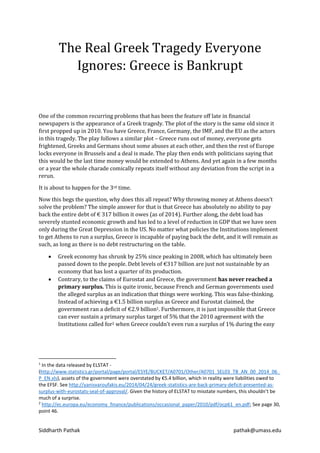
Greece Bankrupt: Debt Unsustainable
- 1. Siddharth Pathak pathak@umass.edu The Real Greek Tragedy Everyone Ignores: Greece is Bankrupt One of the common recurring problems that has been the feature off late in financial newspapers is the appearance of a Greek tragedy. The plot of the story is the same old since it first propped up in 2010. You have Greece, France, Germany, the IMF, and the EU as the actors in this tragedy. The play follows a similar plot – Greece runs out of money, everyone gets frightened, Greeks and Germans shout some abuses at each other, and then the rest of Europe locks everyone in Brussels and a deal is made. The play then ends with politicians saying that this would be the last time money would be extended to Athens. And yet again in a few months or a year the whole charade comically repeats itself without any deviation from the script in a rerun. It is about to happen for the 3rd time. Now this begs the question, why does this all repeat? Why throwing money at Athens doesn’t solve the problem? The simple answer for that is that Greece has absolutely no ability to pay back the entire debt of € 317 billion it owes (as of 2014). Further along, the debt load has severely stunted economic growth and has led to a level of reduction in GDP that we have seen only during the Great Depression in the US. No matter what policies the Institutions implement to get Athens to run a surplus, Greece is incapable of paying back the debt, and it will remain as such, as long as there is no debt restructuring on the table. Greek economy has shrunk by 25% since peaking in 2008, which has ultimately been passed down to the people. Debt levels of €317 billion are just not sustainable by an economy that has lost a quarter of its production. Contrary, to the claims of Eurostat and Greece, the government has never reached a primary surplus. This is quite ironic, because French and German governments used the alleged surplus as an indication that things were working. This was false-thinking. Instead of achieving a €1.5 billion surplus as Greece and Eurostat claimed, the government ran a deficit of €2.9 billion1. Furthermore, it is just impossible that Greece can ever sustain a primary surplus target of 5% that the 2010 agreement with the Institutions called for2 when Greece couldn’t even run a surplus of 1% during the easy 1 In the data released by ELSTAT - (http://www.statistics.gr/portal/page/portal/ESYE/BUCKET/A0701/Other/A0701_SEL03_TB_AN_00_2014_06_ P_EN.xls), assets of the government were overstated by €5.4 billion, which in reality were liabilities owed to the EFSF. See http://yanisvaroufakis.eu/2014/04/24/greek-statistics-are-back-primary-deficit-presented-as- surplus-with-eurostats-seal-of-approval/. Given the history of ELSTAT to misstate numbers, this shouldn’t be much of a surprise. 2 http://ec.europa.eu/economy_finance/publications/occasional_paper/2010/pdf/ocp61_en.pdf; See page 30, point 46.
- 2. Siddharth Pathak pathak@umass.edu times3. Yet somehow Brussels fooled itself by thinking that Athens could achieve that high a target. Looking at the numbers it is very evident that tax revenues will never be able to offset any outflows for debt payments, at least in the near future. In Jan 2015, Athens’ tax collections fell way below than the budget estimates: 23% below the estimated target of €4.54 billion4. And while taxes have been demanded to be increased across the board by Brussels, never it once occurred that in a situation where per capita incomes have fallen by 25%, increasing taxes further dis-incentivizes people to NOT pay their taxes. Even stranger is the demand for increase in VAT from 13% to 23%, and removing the tax subsidies for shippers. Shipping and tourism are the two biggest contributor to the Greek economy, and the latter has been the only less affected sector in the last 5 years. The increase in VAT is going to have some considerable impact on the tourism industry, while removing tax subsidies is going to harm the shipping industry, meaning further decline in Greek economy. There’s no getting around the elephant in the room: austerity. In a time when debt was skyrocketing from being 110% in 2008 to 150% in 2010, Brussels + IMF embarked on a program of a massive slashing of government spending and increasing taxes in a recessionary environment which just killed the Greek economy, and rendered the whole debt unable to be repaid. Even on a simple arithmetic basis, without any nominal increase in the debt after 2008, by 2015 that same amount would have ended up being 147%, owing to the fall in the GDP. The estimations made by the creditors were quite horribly off logic. The simple ground reality is that Greece, in essence is bankrupt. It has an insolvency problem which is unfortunately being administered for liquidity problems by Brussels. It is in no position to payback, and further continuation of the charades in Brussels are going to further increase the inevitable losses on the debt owed to the Institutions. The country is going to miss whatever rosy estimates the Institutions have set, particularly the IMF. It is no wonder why the organization is now claiming that its own estimates in 2012 about Greek debt to be “substantially lower than 110%” (its own words) by 2022 are not going to be correct5. A restructuring of the Greek debt is inevitable. It doesn’t matter if the Germans, the Finns, the Dutch and the others choose to deny it; basic math trumps all wishes, especially those of the politicians. 3 As can be seen here – (http://sdw.ecb.europa.eu/quickview.do?SERIES_KEY=121.GST.Q.GR.N.D1300.PDF.D0000.CU.E) 4 From here - http://www.businessinsider.com/greeces-tax-revenues-slumped-23-below-target-in-january- 2015-2?IR=T 5 http://www.imf.org/external/pubs/ft/scr/2015/cr15186.pdf; it is a fascinating read into just what abysmal failures all the agreements and deals have been.
